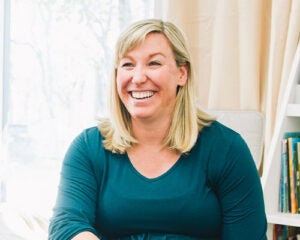The College of Education’s Reimagine Education initiative focuses on interdisciplinary work in how the college prepares students for their future professional endeavors. One signature impact area within this approach is attending to place and context, ensuring that we are focused on respecting and supporting our families and community in the places where it matters most. It was with this in mind that Dr. Laura Estep, assistant professor of practice in the Department of Special Education, created an opportunity for graduate students to present with local community partners serving the autistic community.

Incorporating the community allows for more opportunities to share information on topics of importance to autistic individuals and their families, provide effective services to meet individual family needs, and connect autistic individuals and their families with appropriate supports and resources,
said Estep. It’s my hope that these community partnerships will provide mutual learning and growth for our community partners and also for our graduate students.
Graduate students in the Autism and Developmental Disabilities program and the Early Childhood Special Education program already complete practicum placements at service providers around Austin, but they rarely have the opportunity to work directly with community partners to share information and provide support. Estep formed partnerships with two local organizations: Longhorn TIES and the Autism Society of Texas (AST). Longhorn TIES Neurodiversity Support is a campus organization that seeks to enhance the student experience for students who identify as neurodivergent through advocacy, connections, and training throughout a student’s time at UT.
Ashley Richardson-Minnitt, autism spectrum education and outreach administrator who manages Longhorn TIES, was excited by the opportunity for peer presentations that involve both parties being on equal footing.
We hope this partnership creates opportunities for our TIES students to experience different ways of learning. The peer presentation model is a great way to learn new skills in a collaborative way,
Richardson-Minnitt shared. TIES students will not only get an opportunity to learn new skills or strategies from their peers, but they will also have an opportunity to share what they know in a peer-to-peer learning format.
Graduate students presenting to TIES are also looking forward to the experience. I am excited to have the opportunity to collaborate and offer my support to autistic adults in the UT community,
said Alex Williams, a graduate student in the Autism and Developmental Disabilities program. With the peer approach, I look forward to learning from one another, allowing us both to gain new perspectives on navigating college life.
The Autism Society of Texas (AST), a branch of the Autism Society of America, focuses on creating connections and empowering everyone in the Autism community with the resources needed to live fully. AST supports autistic individuals of all ages and their families across the entire state, providing community inclusion events, recreation, and support groups.
Graduate students will be presenting to both an autistic adult group as well as a parent support group. Leslie Jackson, director of statewide education and outreach at AST, shared her hopes for this partnership. We hope the student presenters will learn more about Autism firsthand by getting connected with Autistic adults and through the lens of the parents and caregivers. Through this experience it is our hope students will learn and grow in their understanding of Autism so they may better serve and educate in their future endeavors,
she continued.
Graduate student Ellen Cho from the Early Childhood Special Education program will be presenting to the parent support group and is excited to share knowledge with parents and caregivers in the community. I think this is an amazing opportunity to put one of UT’s core values into action: putting research to practice,
she said. I’m excited to spread knowledge and support to families in the community who have children with autism. I am excited to enhance my learning and grow as a student and I hope to make an impact on parents from AST!
Students will be presenting to community partner groups across both the fall and spring semesters. We wanted to start small this year, but we hope to continue to grow these partnerships in the future,
said Estep. It’s our hope that the Department of Special Education can continue to support our community partners and find new ways to enhance our involvement in meaningful ways in the coming years.

